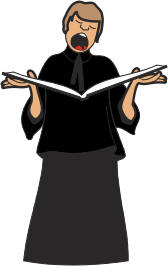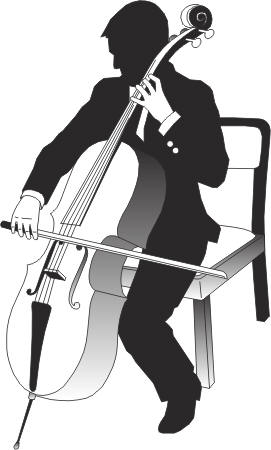|
Classical Music Can
Reduce Crime
By Barrington H.
Brennen, August 19, 2013, 2022
PDF Format
Music
and the Quality of Life ,
Music, the Brain
and Your Health,
The
Junkanoo Pains, Junkanoo Isn't Enough
Almost fifty years ago I
was studying in a college located on the beautiful Caribbean
island, Jamaica. I was greatly involved in the music culture
of the college and the island. I sang in the
semi-professional choir, served as the church organist, and
performed in all the major musical events on campus. I had
the privilege of singing all over the island in church
halls, music theaters, schools, and ball rooms. For two
consecutive years I was elected by the national music
committee as the most outstanding male singer on the entire
island. What intrigued me the most was the great
appreciation grassroots people had for art songs and
classical music. Whether they liked it or not, I am not
sure. However, one thing was certain, they showed deep
respect for the performer and the art of performing, no
matter what kind of music it was. When I performed in tiny
country churches, people would walk long distances just to
hear me sing, without an accompaniment, simple Negro
spirituals. Often after singing songs like "City Called
Heaven", "Ride On King Jesus" or "Were You There," there
would be a standing ovation. "Sing it again" someone would
shout from the audience. It was a blessing to see the
response.
A CULTURE
SHOCK
When I returned
to The Bahamas in 1978, I was in for an unexpected culture
shock. Within two weeks of returning home I was asked to
sing in a concert some of the same songs that thrilled
hundreds in Jamaica. As I began singing some people started laughing,
others walked out, and yet still others showed a great
disinterest by the expression on their faces. Although I was
determined not to let that deter me I had to tell my self to
"sing on, sing on." I was grateful for the few who did
express great appreciation for the performances. It was
really a shock. It was just a few weeks earlier when
everyone listening respected the music although some may not
have liked it. Now, back home in my own country, while
singing the same songs, I was being laughed at. Certainly
some did not like the music and a greater number were
disrespectful and could not appreciate the art form.
Jamaica. As I began singing some people started laughing,
others walked out, and yet still others showed a great
disinterest by the expression on their faces. Although I was
determined not to let that deter me I had to tell my self to
"sing on, sing on." I was grateful for the few who did
express great appreciation for the performances. It was
really a shock. It was just a few weeks earlier when
everyone listening respected the music although some may not
have liked it. Now, back home in my own country, while
singing the same songs, I was being laughed at. Certainly
some did not like the music and a greater number were
disrespectful and could not appreciate the art form.
Several years ago
I wrote an article entitled "Junkanoo Isnít Enough" from
which I received numerous responses. Here are a few lines
from that article: "I am often amazed how so many Bahamians
get so excited over musical renditions where the
performances leave much to be desired in the serious world
of music. The guitars are not properly tuned. The players
are picking unrhythmically loud while the drummers hit the
drums tumultuously beyond the sound of the voices. The
trumpets and horns are being blown through with gusts of air
producing harsh sounds. In addition, the singers shout with
vain-engorged necks, thus ending the performance with sore
throats. The music seriously lacks dynamics or color. But to
the uncultured ear, these unrefined aspects of the rendition
cannot be recognized. After such cheap "grand" performance,
the people stand to their feet in all excitement and
"respect." But when a well-in-tuned, dynamic, harmonious
form of music is presented, there is an awesome uneasiness,
laughter, or disrespect. These two stunning differences are
too commonly obvious at concerts in our country today."
VARIETY IS
NEEDED
It is my view
that when more of the Bahamian residents develop respect and
appreciation for kinds of music other than Junkanoo, we will
see a decrease in the crime rate. I am not suggesting that
one must like classical music. However, believe it or not,
whether or not you like classical music listening to it can
impact you positively. I believe there are also many forms
of music that can bring discipline of mind. For example:
light Jazz, light Calypso, operatic music, baroque music,
traditional spirituals, southern gospel, and mush more. But
when one sticks to only listening to or only appreciating
one  kind
of music it stifles growth. This is especially true for
those who only listen to unrefined performance of Junkanoo
music, some forms of rap music and others like this. kind
of music it stifles growth. This is especially true for
those who only listen to unrefined performance of Junkanoo
music, some forms of rap music and others like this.
MUSIC CAN
IMPACT CRIME
Once more it is
my view that the more we have people participating in or
listen to the more refined music (classical, spirituals,
etc.) it can impact the crime level in our country.
In an article
entitled "How Classical Music Can Reduce Crime, Benefit Your
Mood and Increase Your Spending" it talked about the impact
of classical music on crime. Here are two paragraphs from
that article: "In 2004 in London, England, the British
Transport Police piped classical music into London
Underground stations in some of the area's most dangerous
neighborhoods. After playing the music for six months hereís
what happened. Robberies were cut by 33 percent. Staff
assaults decreased by 25 percent. Vandalism went down 37
percent. . . .This is not the first time that classical
music has been used to deter crime. In 2001, police in West
Palm Beach, Florida installed a CD player and speakers on an
abandoned building in a crime-ridden neighborhood. After
playing classical music -- mostly Mozart, Bach and Beethoven
-- 24 hours a day for about three months, shootings, thefts,
loiterers and drug deals decreased."
MY DREAM
I wish that more
Bahamians would get excited about classical and easy
listening music. I am not asking for a decrease in Junkanoo
music. Instead of am seeking for greater respect and
appreciation (not necessarily to love it) for the refined
forms of music. I am certain this will impact our nationís
anxiety and stress levels and decrease crime.
Barrington H.
Brennen is a marriage and
family therapist, and board certified clinical
psychotherapist, USA. Send your questions or comments to
question@soencouragement.org
or write to P.O. Box CB-11045, Nassau, The Bahamas, or visit
www.soencouragement.org
or call 242-327-1980.
|